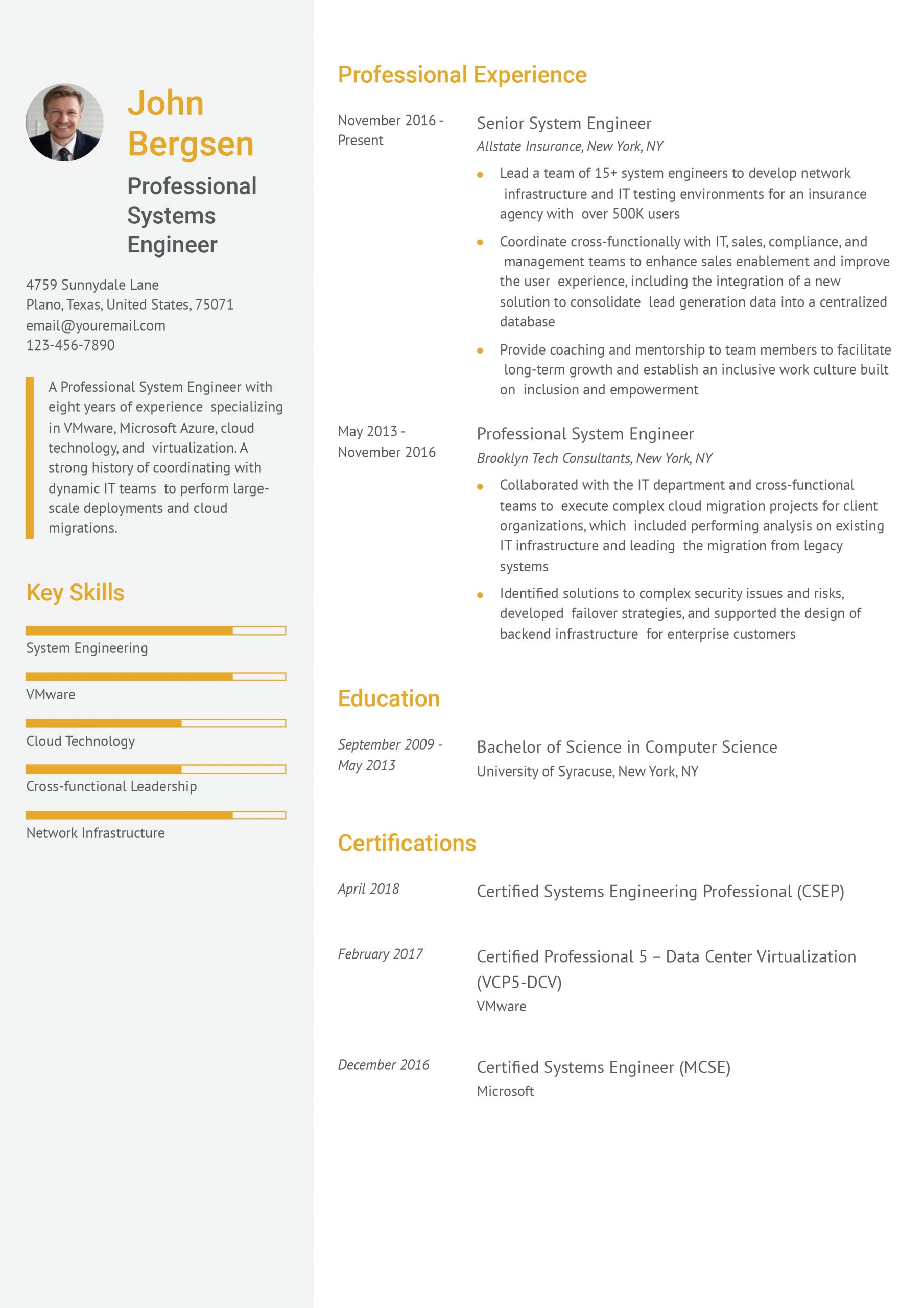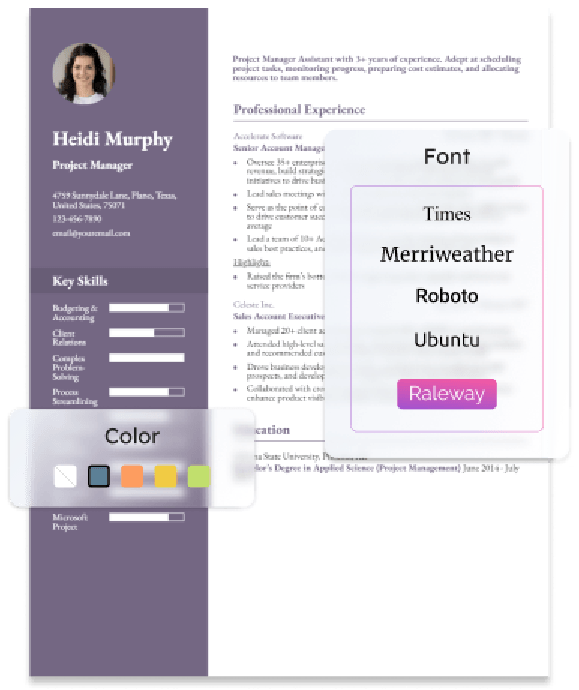To write an eye-catching professional systems engineer resume, provide tangible examples of putting your technology and engineering skills into practice. Paint a picture of your career by highlighting your most compelling technical projects and achievements. In this guide, we’ll provide expert tips and insights to help translate your experience into an accomplishment-driven resume.
Most Popular Professional Systems Engineer Resumes
Professional Systems Engineer Resume Example
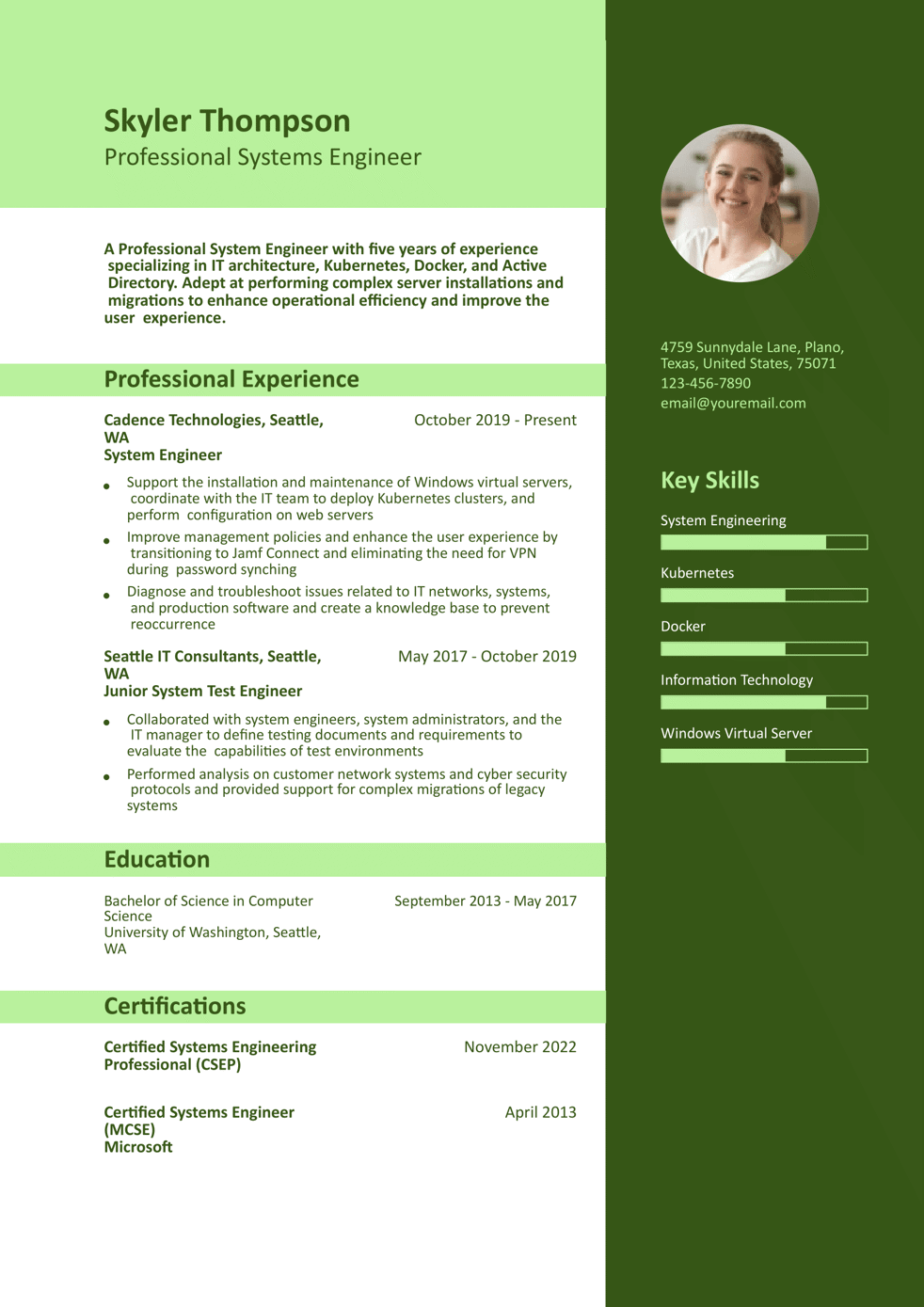
Why this resume works:
This resume showcases expertise in IT architecture and operational improvement through technical precision. Learn more about crafting compelling resumes at How to Make a Resume.
Senior Systems Engineer Resume Example
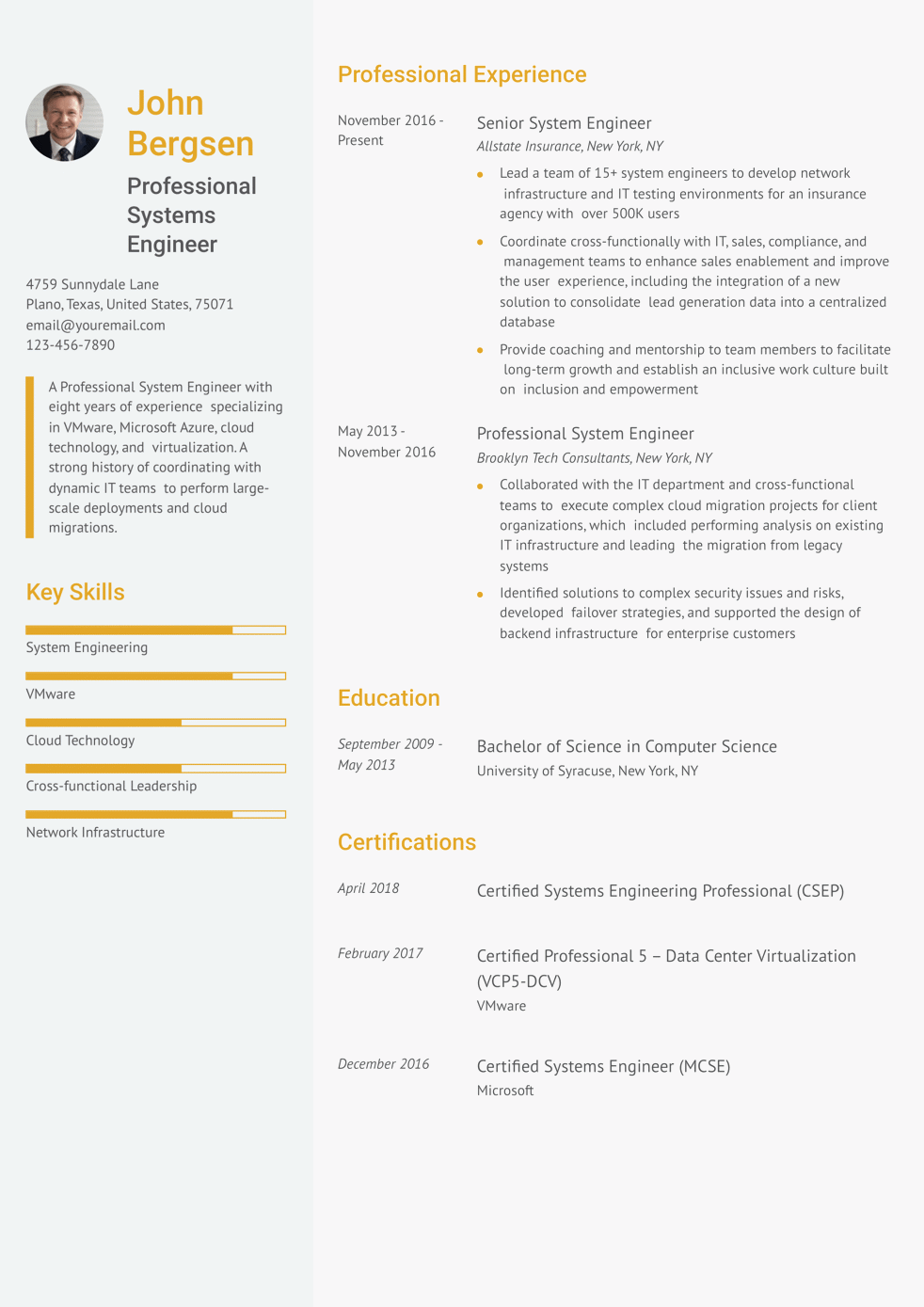
Why this resume works:
This resume highlights leadership, technical expertise, and the candidate's ability to manage large-scale IT projects. Explore tips for showcasing certifications at How to List Certifications on a Resume.
Senior Systems Engineer Resume Example
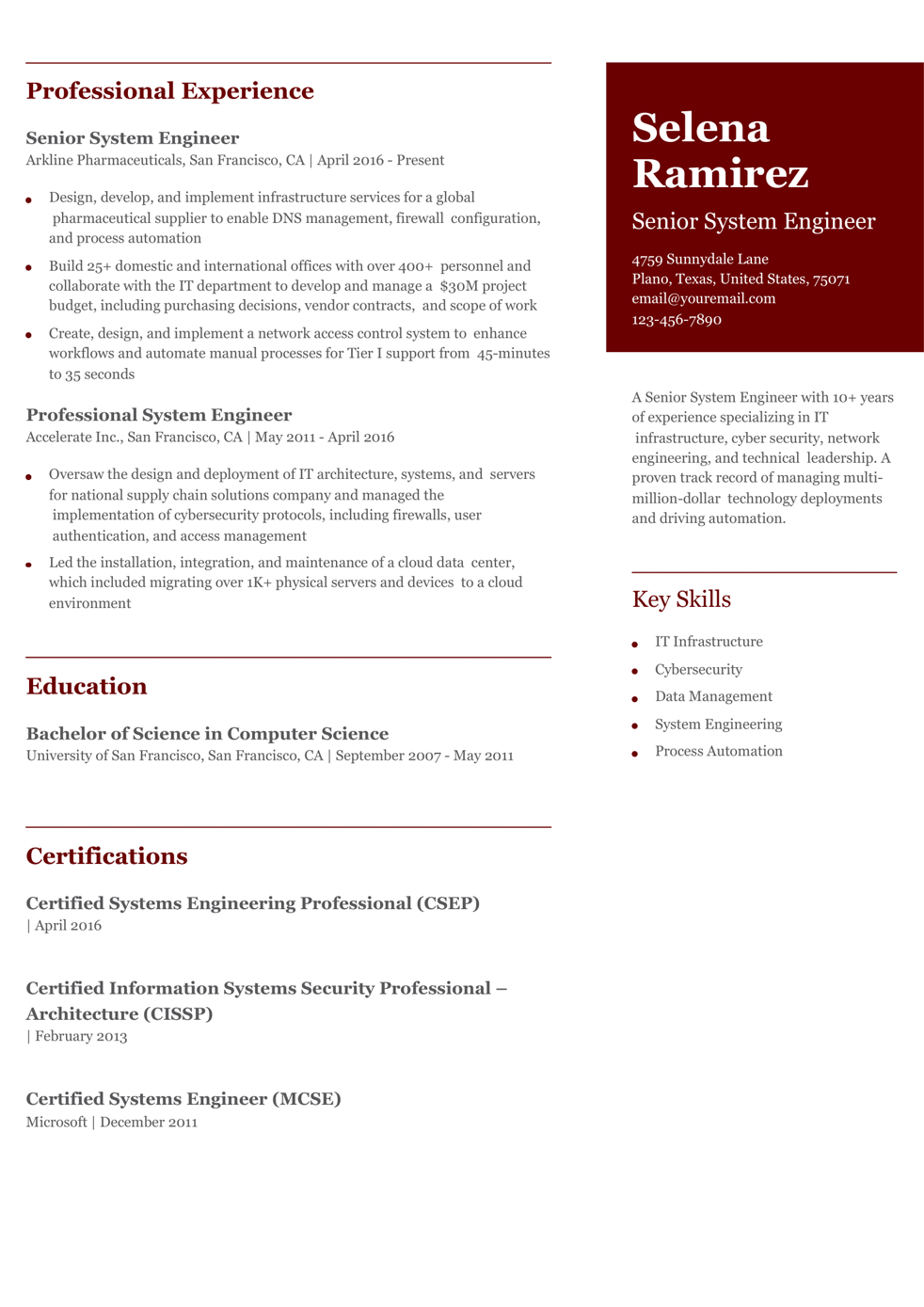
Why this resume works:
This resume highlights process automation skills and large-scale project management experience, which align with senior IT roles. Learn about enhancing technical resumes at Technical Skills for Resume.
Entry-Level Systems Engineer Resume Example
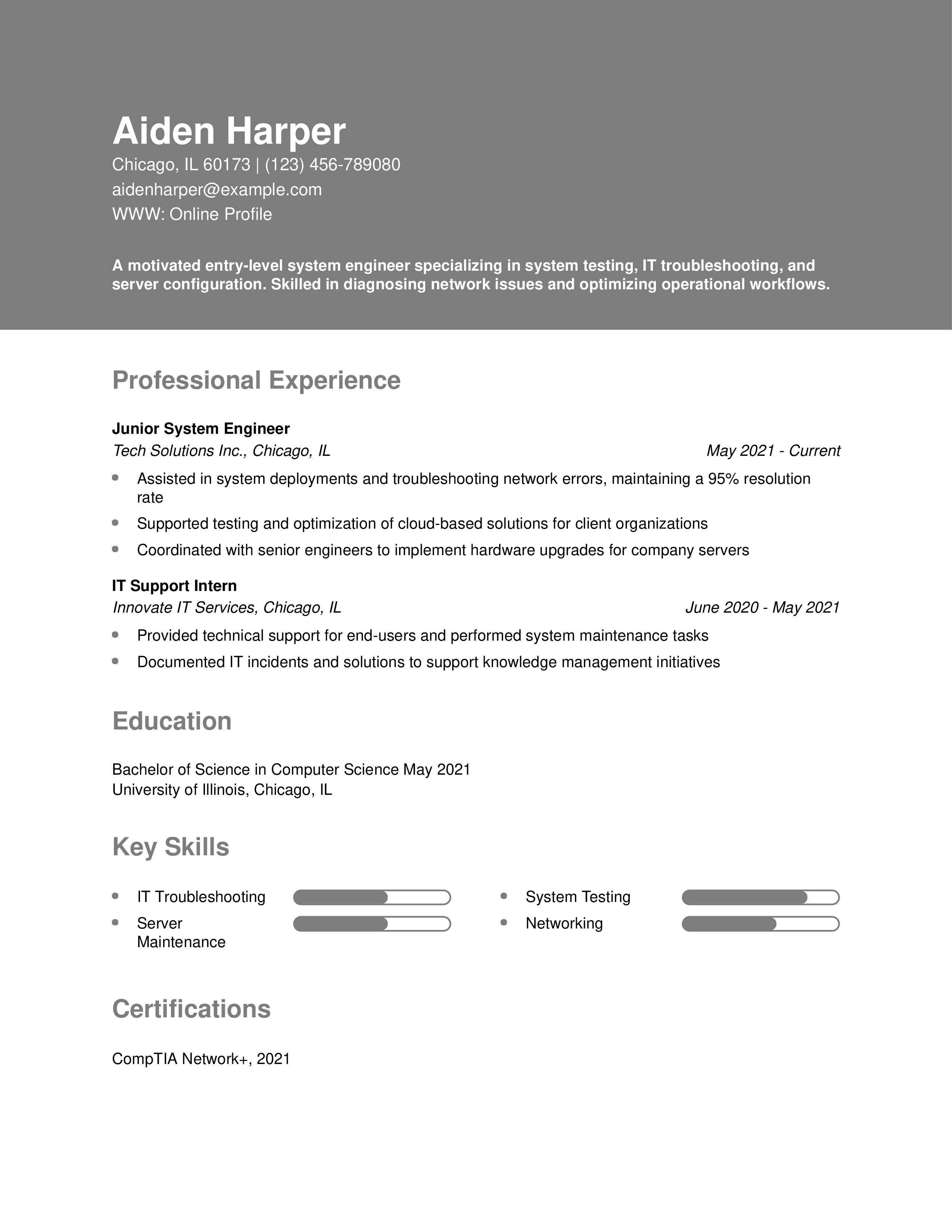
Why this resume works:
This resume effectively showcases relevant experience and certifications for an entry-level system engineer role. Learn how to highlight early-career credentials at How to Put Expected Graduation Date on Resume.
Cloud Systems Engineer Resume Example
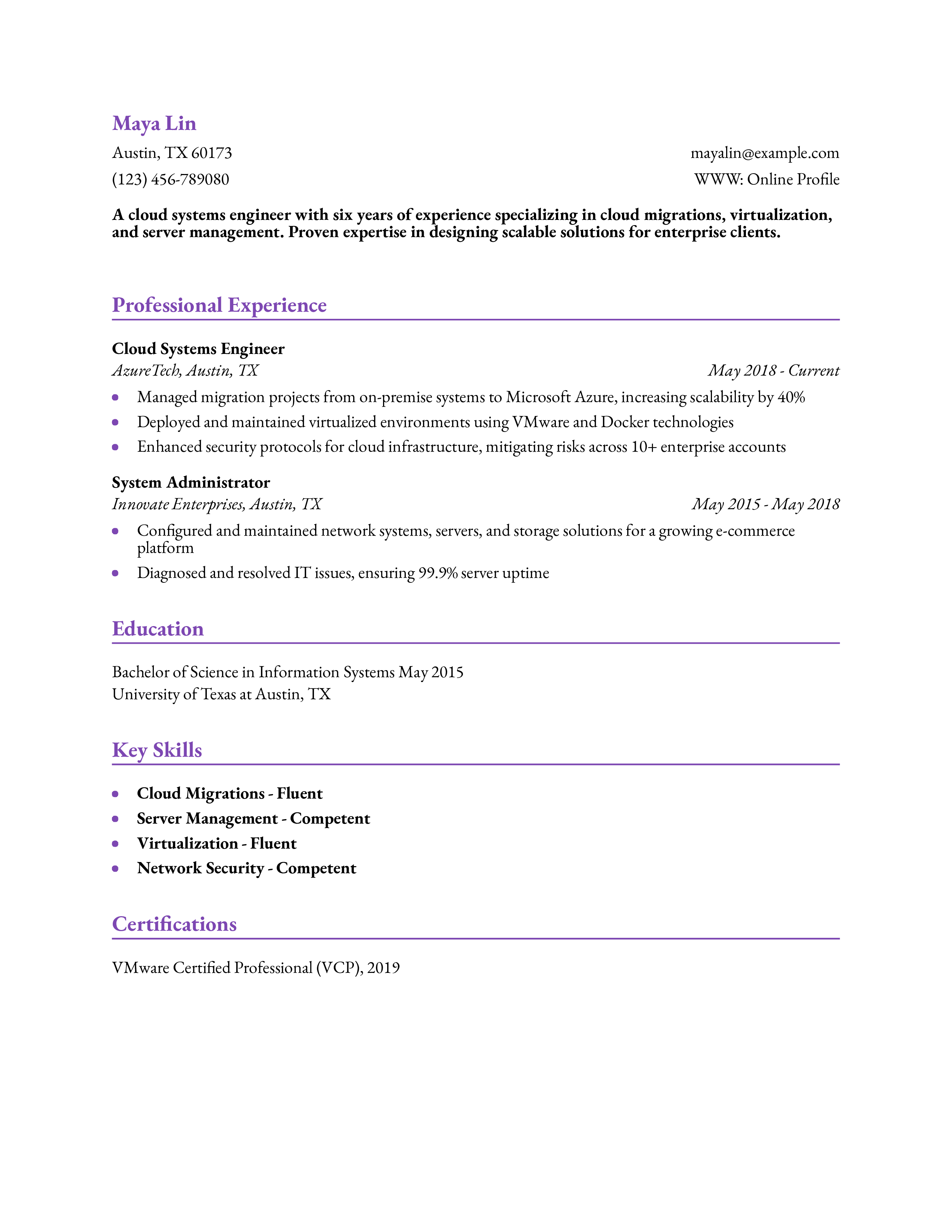
Why this resume works:
This resume combines technical expertise with quantifiable achievements in cloud solutions. For more on showcasing project successes, visit Resume Summary Examples.
Network Systems Engineer Resume Example
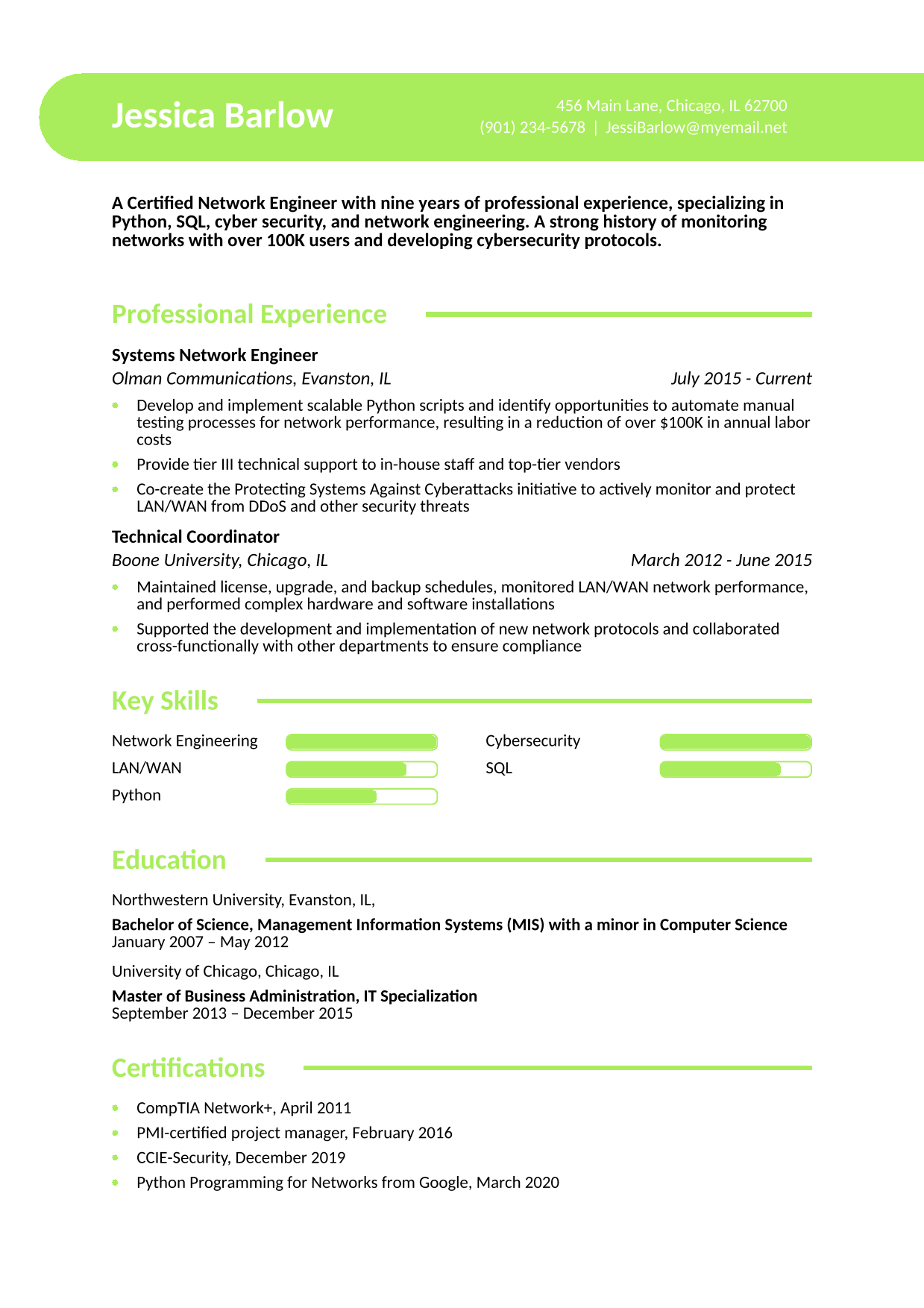
Why this resume works:
This resume effectively presents a blend of technical skills and leadership in network management. Discover how to prioritize technical achievements at Resume Skills.
Our templates are crafted by professional resume writers to make creating your resume quick, easy, and effective.
- Professional resume template downloads
- Customized cover letter generation
- AI resume writing support
- Career-building resources and advice
Professional Systems Engineer Text-Only Resume Templates and Examples
How To Write a Professional Systems Engineer Resume
1. Craft an outstanding profile with a summary of your professional systems engineer qualifications
Lead your resume with a dynamic profile that captures the hiring manager’s attention.
Start with an opening sentence that lists your title, years of experience, and three to four skills that align with the organization’s needs. Feature your technical acumen and leadership capabilities equally, as companies are drawn to versatile candidates who can collaborate effectively in diverse team environments. Tailor your profile towards each individual job posting.
For example, if you’re applying to an e-commerce company, discuss how your previous systems upgrades helped to drive an increase in revenue. If an organization seeks an engineer to enhance cybersecurity, mention your background in developing security protocols and implementing network access control systems.
Profile - Example #1
A Professional System Engineer with five years of experience specializing in IT architecture, Kubernetes, Docker, and Active Directory. Adept at performing complex server installations and migrations to enhance operational efficiency and improve the user experience.
Profile - Example #2
A Senior System Engineer with 10+ years of experience specializing in IT infrastructure, cyber security, network engineering, and technical leadership. A proven track record of managing multi-million-dollar technology deployments and driving automation.
2. Create a powerful list of your professional systems engineer experiences
Employers value candidates who generate results, and the best way to demonstrate this is by incorporating key metrics and data to quantify your career achievements. Because hiring managers may not all be tech-minded, include narrative-based accomplishments that describe your contributions and the bottom-line value you generated for past employers.
For example, don’t simply say you performed 12 backups daily. Say why that was important, such as, “Conducted 12 backups daily to archive extraneous data and improve system performance by 30%.” Create concise yet descriptive bullet points that include action verbs, technical skills, and specific metrics.
Professional Experience - Example #1
System Engineer, Cadence Technologies, Seattle, WA
October 2019 – Present
- Support the installation and maintenance of Windows virtual servers, coordinate with the IT team to deploy Kubernetes clusters, and perform configuration on web servers
- Improve management policies and enhance the user experience by transitioning to Jamf Connect and eliminating the need for VPN during password synching
- Diagnose and troubleshoot issues related to IT networks, systems, and production software and create a knowledge base to prevent reoccurrence
Professional Experience - Example #2
Senior System Engineer, Arkline Pharmaceuticals, San Francisco, CA
April 2016 – Present
- Design, develop, and implement infrastructure services for a global pharmaceutical supplier to enable DNS management, firewall configuration, and process automation
- Build 25+ domestic and international offices with over 400+ personnel and collaborate with the IT department to develop and manage a $30M project budget, including purchasing decisions, vendor contracts, and scope of work
- Create, design, and implement a network access control system to enhance workflows and automate manual processes for Tier I support from 45-minutes to 35 seconds
3. Include education and certifications relevant to professional systems engineers
Create a dedicated section of your resume for certifications and education. Because employers may require these, they could start by sorting resumes that meet minimum education requirements before reading other parts of your document. If hiring managers have to work hard to find education details on your resume, they might toss it aside instead.
Include any college degrees you have, even if they aren’t specific to software or computer science. A degree in business alongside numerous relevant certifications could demonstrate that you have a strong work ethic, an eclectic background, and the desire to succeed in a tech position. That’s especially true if you pair it with experience in systems engineering work.
Education
Template
- [Degree Name]
- [School Name], [City, State Abbreviation] – [Graduation Month and Year]
Example
- Bachelor of Science (B.S.) Computer Science
- University of Washington, Seattle, WA September 2013 – May 2017
Certifications
Template
- [Certification Name], [Completion Year]
Example
- Certified Systems Engineering Professional (CSEP), 2022
4. Make a list of your professional systems engineer-related skills and proficiencies
Listing the right skills on your resume helps you demonstrate to employers you have the qualifications they’re looking for. These proficiencies also act as important keywords, which applicant tracking systems (ATS) are programmed to look for. If your resume lacks relevant skills or keywords, automated systems may not pass it on to hiring managers.
List your most relevant and pertinent skills in their own section on your resume to make them easy to find. You could also incorporate some in your experience section by writing bullet points such as, “Reduced recovery and downtime by 50% via data backup and AWS implementation.”
Consider some of the common key skills for professional systems engineers below:
| Key Skills and Proficiencies | |
|---|---|
| Active directory | Cloud technology |
| Cross-functional collaboration | Cybersecurity |
| Database administration | Disaster recovery |
| Docker | Domain Name System (DNS) |
| Information technology (IT) | IT architecture |
| IT infrastructure | Kubernetes |
| Microsoft Azure | Network infrastructure |
| Project management | System administration |
| System engineering | VMware |
| Virtual private network (VPN) | Windows Virtual Server |
How To Pick the Best Professional Systems Engineer Resume Template
As a professional systems engineer, you must convey technical skills and experience so that hiring managers are confident in your qualifications. A template that keeps design elements to a minimum, supports enough white space to ensure the document is scannable, and highlights your skills and past work accomplishments is key to doing this.
Look at templates that pull technical skills into their own easy-to-find list to make it easy for employers to see if you have patch management or Microsoft Exchange experience. These sections might be set off by simple design elements, such as lightly colored background boxes or lines, that keep the page visually pleasing and clean overall.
Frequently Asked Questions: Professional Systems Engineer Resume Examples and Advice
How do I ensure my Professional Systems Engineer resume example is ATS-friendly?-
To make your Professional Systems Engineer resume example ATS-friendly, focus on including relevant keywords from the job description and avoid using complex formatting like images or non-standard fonts. Keep the document simple and ensure each section is clearly labeled (e.g., Education, Professional Experience, Skills). The use of action verbs and proper section headings will also help your resume get noticed by both ATS and hiring managers.
What are common action verbs for professional systems engineer resumes?-
Action verbs make it easy for hiring managers to access information about your skills and experience quickly. Starting sentences and bullet points with action verbs helps make your resume punchier and scannable. It also points employers to specific accomplishments they might be most interested in.
For example, if you write “deployed feature upgrades that supported 95% software subscription renewals,” employers can quickly find something on your resume that correlates with deployment and implementation experience.
Use verbs you think are most pertinent. Some common action verbs related to professional systems engineers are provided below.
| Action Verbs | |
|---|---|
| Administered | Automated |
| Configured | Deployed |
| Designed | Developed |
| Diagnosed | Engineered |
| Evaluated | Implemented |
| Integrated | Maintained |
| Optimized | Planned |
| Resolved | Tested |
| Troubleshot | Upgraded |
| Validated | Verified |
How do you align your resume with a job description?-
According to the Bureau of Labor Statistics, the average annual salary for professional system engineers was $90,520 in 2022. Although prospects for technology careers remain bright, you’ll still need to create a compelling resume to differentiate yourself from other candidates during your job search. The best way to grab the attention of prospective employers is by aligning your resume with the job description.
For example, if an organization is seeking a candidate with expertise in cloud technology, highlight your knowledge of Microsoft Azure and your experience supporting large-scale cloud migration projects. If a company is looking for a cybersecurity professional, provide insights into your knowledge of cloud security and access management protocols. By tailoring your resume to individual job postings, you’ll greatly increase your chances of securing your next interview.
What is the best professional systems engineer resume format?-
Reverse chronological format is ideal for professional system engineer resumes. This approach helps you create a compelling narrative for your experience, starting with your most recent work history.
For example, you might list cybersecurity awareness and cloud infrastructure in your skills section. At the same time, you could have a bullet point in your experience section noting that you identified a security weakness and implemented solutions for a past employer, reducing downtime by 15%. This type of connection across your resume helps you tell a story that engages employers and ensures hiring managers see you as a qualified candidate.
How many pages should my professional systems engineer resume be?-
Generally, a professional systems engineer resume should be one page for candidates with fewer than 10 years of experience. A two-page resume is acceptable if you’re a seasoned professional with extensive accomplishments—but only if it provides meaningful details that strengthen your application. Tailor your content to the job, focusing on your most relevant qualifications.
Work history should typically cover the last 10 to 15 years. Older positions can be excluded or briefly summarized unless they’re highly relevant. A concise, focused resume demonstrates your ability to prioritize and communicate effectively.
Craft your perfect resume in minutes
Get 2x more interviews with Resume Builder. Access Pro Plan features for a limited time!

Not sure where to get started with a cover letter? Our software engineer resume cover letter example provides some help.
